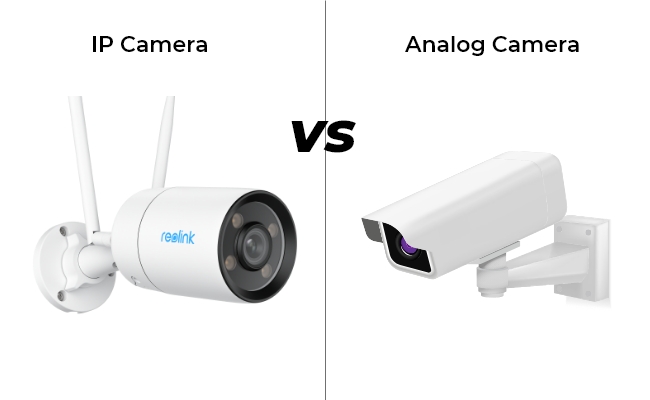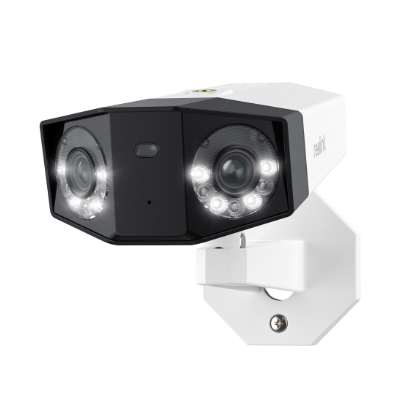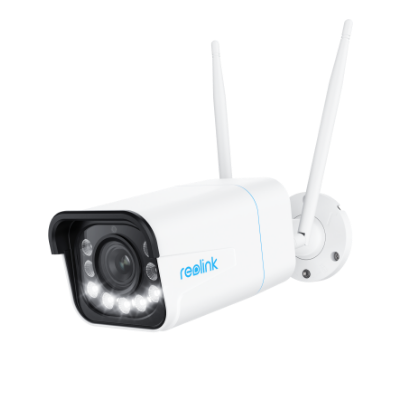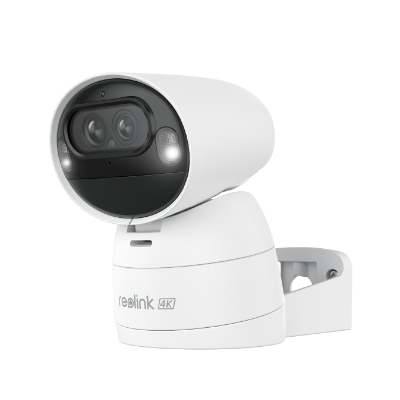Analog vs IP Cameras: What's the Difference?

Security cameras are broadly classified into two types: IP (Digital) and Analog cameras. Before selecting any of them for your home security, you should know their difference to make the right choice according to your needs.
In this article, we will discuss IP vs Analog cameras. We will explain what these are and highlight their differences and pros & cons. We will also explain your choice and share some incredible products.
IP vs Analog Cameras: Basics of Them
What is an Analog Camera?
An analog camera captures videos or images and sends them via coaxial cables in the form of electrical signals. It is connected to a DVR (Digital Video Recorder), which receives data through the cable.
The DVR is the system's brain. It converts signals into digital form and compresses videos to be saved on the hard drive. You can connect multiple cameras to the DVR.
It is a very basic and old technology, which is the reason you don’t see advanced features.
What is an IP Camera?
An IP (Internet Protocol) camera is a digital camera that captures videos and images and then processes them on its own. It acts as the actual brain, and there is no need for a recorder. It can save the data on a microSD card, local storage, cloud storage, or NVR.
It sends data via an IP network. It can be either a wireless (Wi-Fi/LTE) or wired (PoE) camera. The most important thing is the features and quality it offers, which is why it is preferred over analog cameras.
IP vs Analog Cameras: Key Differences
IP cameras and analog cameras differ in various aspects, including quality, features, technology, etc. Let’s see their key differences in detail.
Image Quality
IP cameras are extremely superior in terms of image quality. You can find 1080p to 4K resolution cameras offering sharp, clear images with incredible details. There are no grains or distortions in the images. Due to the digital nature and the processing within the camera, analog cameras can’t compete with IP cameras in image quality.
Analog cameras have low megapixels and resolution. The typical resolution is 480p, which is extremely low. You can expect high resolution from analog cameras. And even if you buy the highest resolution available, you will experience grains in the image, which ruins the clarity.
Power and Connectivity
Analog cameras require a separate wired power supply, which can be connected to an AC outlet using an adapter. For video transmission, coaxial cables must be connected to a DVR. Separate wiring will also be needed for transmitting audio and controlling the pan and tilt.
On the other hand, IP Wi-Fi cameras require only a wired power connection, and they transmit data over Wi-Fi. PoE cameras require only an Ethernet cable for power and data transmission. Even though IP cameras offer advanced features, connecting them is extremely simple.
Transmission
Analog cameras are capable of sending data to a massive distance. They can go up to 1.5 kilometers with twisted pair cables as they do not require internet.
Digital cameras require the Internet, either through Wi-Fi or Ethernet. Wi-Fi has a limited range, and Ethernet cables can transmit data up to 100 meters. With the help of repeaters, the range can be increased up to 500 meters.
Another thing that matters in transmission is the security. Analog cameras aren’t secure. Anyone can temper the coaxial cable and intercept the transmitted data.
IP cameras are encrypted. Even if someone tries to intercept data, it will be useless because of encryption.
Data Storage
Analog cameras require a DVR to process and store data.
In contrast, IP cameras can store data on a microSD card, hard drive, cloud storage, or NVR. They are more flexible in terms of storage.
Intelligent Monitoring
You can’t expect intelligent monitoring from analog cameras. They can’t process these advanced features.
IP cameras are intelligent enough to distinguish between humans, pets, and vehicles. They track motion and send accurate alerts on devices.
Ease of Installation
Analog cameras are extremely simple to install. All they need is a coaxial cable, which can be installed easily. However, it becomes a bit hectic if multiple cables are required for different features, such as sound and PTZ. Their cabling becomes complex with distance and features.
IP cameras are a bit technical due to a network system. However, they can also be installed easily.
Expandability
IP cameras can be expanded without any hassle. If you want to connect PoE cameras, you only need one Ethernet cable. Similarly, multiple Wi-Fi cameras can be connected to a network.
The complexity of cabling in analog cameras creates issues in expandability.
IP vs Analog Cameras: Pros and Cons
Pros and Cons of IP Camera
Pros:
- The video quality of IP cameras is exceptional because of their high resolution.
- They process the video within the camera and offer advanced features.
- They are extremely easy to install, which is just like a DIY task.
- The security of data transmission is exceptional due to encryption.
- IP cameras can be accessed from any location.
- The wiring of IP cameras is simple.
Cons:
- IP cameras can’t cover long distances over 500 meters.
Pros and Cons of Analog Camera
Pros:
- Analog cameras are simple and easy to set up.
- The cost of analog cameras is lower than IP cameras.
- Compatibility isn’t an issue in analog cameras. Cameras from different brands can also work together.
- It can cover a larger area up to 1.5 kilometers using twisted-pair cables.
Cons:
- The image quality is low.
- For multiple functions, you need multiple cables.
- It lacks advanced features.
IP vs Analog Cameras: Which One Should You Choose?
If you want to cover a long distance using cameras, analog cameras can be used for that. They cover more distance than IP cameras.
Other than that, IP cameras are better in every aspect. They offer better image quality, features, storage flexibility, remote access, data security, ease of installation, intelligent monitoring, and a lot more.
IP cameras are much better than analog cameras. Without any question, you can go with them for home security, business, commercial areas, remote property, baby monitoring, or any other purposes. They are exceptionally great and reliable.
Best IP Cameras Recommendations
16MP Dual-Lens PoE IP Camera - Reolink Duo 3 PoE
Duo 3 PoE is a PoE camera for reliable indoor and outdoor surveillance. It offers two 4K resolution sensors and 16MP UHD clarity to uncover intricate details. Its dual-lens covers a 180⁰ wide area, which captures more information in a frame. It offers motion tracking, color night vision, smart detection, two-way audio, double warning, etc.
Groundbreaking 16MP Dual-Lens PoE Camera
16MP UHD, Dual-Lens, Motion Track, 180° Wide Viewing Angle, Power over Ethernet, Color Night Vision.
4K Wi-Fi 6 IP Camera - RLC-811WA
RLC - 811WA is a Wi-Fi 4K (8MP) security camera that offers incredible image quality and intricate details. It is powered by Wi-Fi 6 technology and uses dual bands for reliable and fast performance. It allows users 5X zoom to get optimal visibility. It offers time-lapse, color night vision, weatherproofing, real-time alerts, flexible storage, etc.
4K WiFi 6 Security Camera with Night Vision
4K 8MP Ultra HD, Dual-Band WiFi 6, Color Night Vision, 5X Zoom, Smart Detection, Two-Way Audio, Built-in Siren.
4K Dual-lens Battery IP Camera - Argus Track
Argus Track is an innovative dual-lens PTZ camera that covers a wider area and offers 6X zoom for optimal details. It is a Wi-Fi camera with a rechargeable battery, which can also be powered by a solar panel. It offers person, vehicle, and pet detection. The other incredible features are two-way audio, sound & light alarm, auto-zoom tracking, color night vision, etc.
4K Dual-Lens Wi-Fi Solar/Battery Camera
4K 8MP Ultra HD, Auto-Zoom Tracking, Pan, Tilt & 6X Hybrid Zoom, Color Night Vision, Dual-Band Wi-Fi.
FAQs
1. Are IP cameras better than analog?
Yes, IP cameras are way better than analog. They are digital cameras with the latest technology. They offer incredible features, such as motion detection, tracking, instant alerts, two-way audio, etc.
2. Is an IP camera better than an HD camera?
IP cameras are available in a wide range of resolutions. You can find HD, FHD, UHD, and other high resolutions that offer intricate details. Getting a 4K IP camera is easy and affordable.
3. What is the difference between 4K analog and 4K IP cameras?
4K analog cameras do not offer 4K resolution. They transmit data via electrical signals, which limits the rate and volume of data transfer. It is almost impossible to achieve 4K with an analog camera. On other hand, 4K IP cameras offer the exact resolution. They are superior in terms of image quality.
Conclusion
We have discussed IP vs Analog cameras in detail and explained their key differences. Analog cameras offer limited features and subpar video quality. However, IP cameras are advanced. They offer incredible features, including smart detection, real-time alerts, two-way audio, color night vision, etc. They are widely used for security surveillance compared to analog cameras.
Search
Subscribe for the Latest Updates
Security insights & offers right into your inbox



